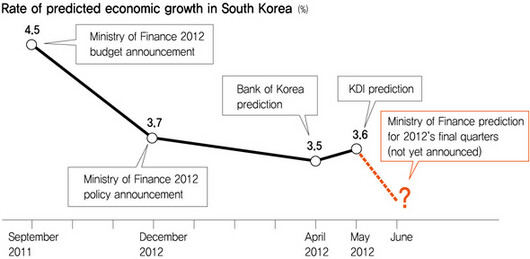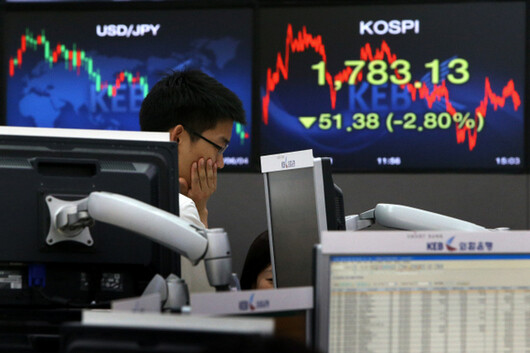hankyoreh
Links to other country sites 다른 나라 사이트 링크
Growing fears of a ‘tsunami’ of economic woe

By Ryu Yi-geun and Lee Jae-myong, staff reporters
Financial Services Commission (FSC) chairman Kim Seok-dong called on his troops to “prepare for battle” as financial crisis looms once again in Europe. Financial authorities have determined that the external economic situation is dire enough now to require combat readiness rather than training exercises.
“We can’t have another crisis like 2008,” fretted a senior finance ministry official who leapt to defend the foreign exchange market on the “front lines” during the global financial crisis. There is a strong sense that the current situation could develop into something just as serious.
The government has been girding for battle in two main ways: financial market policies directed by the FSC, and Ministry of Strategy and Finance policies to limit the shock to the real economy. The FSC said it plans to contain capital market volatility by monitoring short selling on the stock market and margin trading on the foreign exchange market, where investors may invest dozens of times their principal in search of profits. It has yet to mention a ban on short selling like last year’s, arguing that the crisis is not as bad as in the latter half of 2011.
The government, while acknowledging the seriousness of the situation, also feels it is not one that warrants immediate intervention in the stock, bond, and foreign exchange markets. While that market is the main channel for the spreading contagion from Europe, they are confident that South Korea’s immunity has developed since the last financial crisis.
An MSF official said the country’s response capabilities have grown from 2008 in three main respects. “We have more than US$100 billion more in foreign reserves than we did then, we can get our hands on another US$70 billion or so in an emergency through currency swap agreements with China and Japan, and we’ve greatly reduced our short term foreign debt,” the official explained.
The FSC reported the percentage of long-term foreign currency bank loans as up to 74% in late 2011 from just under 50% in 2008. Short-term foreign debt has been a major factor in capital market volatility, as creditors tend to flee the market when external shocks occur.
But the other avenue of contagion, the real economy, is a growing concern for the government. Exports have already begun taking a major hit, with a -0.4% rate of increase last month. The overall balance of trade was positive due to an even larger drop in imports, but the situation in recent months has been a recession-type surplus. Exports to China fell by a double-digit rate last month for the first time in 43 months - a sign that the European recession is spreading to South Korea by way of China, whose largest trading partner is Europe. Even domestic demand has been hit, with consumption up just 1.0% from March to April. China and Europe are South Korea’s two largest export markets.
The Bank of Korea and Korea Development Institute had recently lowered their 2012 economic growth predictions to 3.5% and 3.6%, respectively, when the European financial crisis took a turn for the worse. A senior MSF official hinted that they, too, would be lowering their predictions from the current 3.7%. “The risk of an economic downturn has grown,” the official explained.
Meanwhile, the worsening situation in Europe has shown the need for a financial infusion to head off a spread to the real economy. This is why Finance Minister Bahk Jae-wan announced plans Saturday to increase the level of government fund working expenses by 20% to 30% in order to support SMEs.
“If the crisis turns into an extreme situation where Greece leaves the Eurozone, growth rate predictions are basically meaningless,” said Park Jong-kyu, chief of economic analysis for the National Assembly Budget Office. “There will be a tsunami for the real economy, too.”

Please direct questions or comments to [english@hani.co.kr]

Editorial・opinion
![[Column] Has Korea, too, crossed the Rubicon on China? [Column] Has Korea, too, crossed the Rubicon on China?](https://flexible.img.hani.co.kr/flexible/normal/500/300/imgdb/original/2024/0419/9317135153409185.jpg) [Column] Has Korea, too, crossed the Rubicon on China?
[Column] Has Korea, too, crossed the Rubicon on China?![[Correspondent’s column] In Japan’s alliance with US, echoes of its past alliances with UK [Correspondent’s column] In Japan’s alliance with US, echoes of its past alliances with UK](https://flexible.img.hani.co.kr/flexible/normal/500/300/imgdb/original/2024/0419/2317135166563519.jpg) [Correspondent’s column] In Japan’s alliance with US, echoes of its past alliances with UK
[Correspondent’s column] In Japan’s alliance with US, echoes of its past alliances with UK- [Editorial] Does Yoon think the Korean public is wrong?
- [Editorial] As it bolsters its alliance with US, Japan must be accountable for past
- [Guest essay] Amending the Constitution is Yoon’s key to leaving office in public’s good graces
- [Editorial] 10 years on, lessons of Sewol tragedy must never be forgotten
- [Column] A death blow to Korea’s prosecutor politics
- [Correspondent’s column] The US and the end of Japanese pacifism
- [Guest essay] How Korea turned its trainee doctors into monsters
- [Guest essay] As someone who helped forge Seoul-Moscow ties, their status today troubles me
Most viewed articles
- 1[Column] The clock is ticking for Korea’s first lady
- 2Samsung barricades office as unionized workers strike for better conditions
- 3[Editorial] When the choice is kids or career, Korea will never overcome birth rate woes
- 4[News analysis] After elections, prosecutorial reform will likely make legislative agenda
- 5S. Korea, Japan reaffirm commitment to strengthening trilateral ties with US
- 6All eyes on Xiaomi after it pulls off EV that Apple couldn’t
- 7After 2 months of delayed, denied medical care, Koreans worry worst may be yet to come
- 8US overtakes China as Korea’s top export market, prompting trade sanction jitters
- 9[Column] Has Korea, too, crossed the Rubicon on China?
- 10Hong Se-hwa, voice for tolerance whose memoir of exile touched a chord, dies at 76